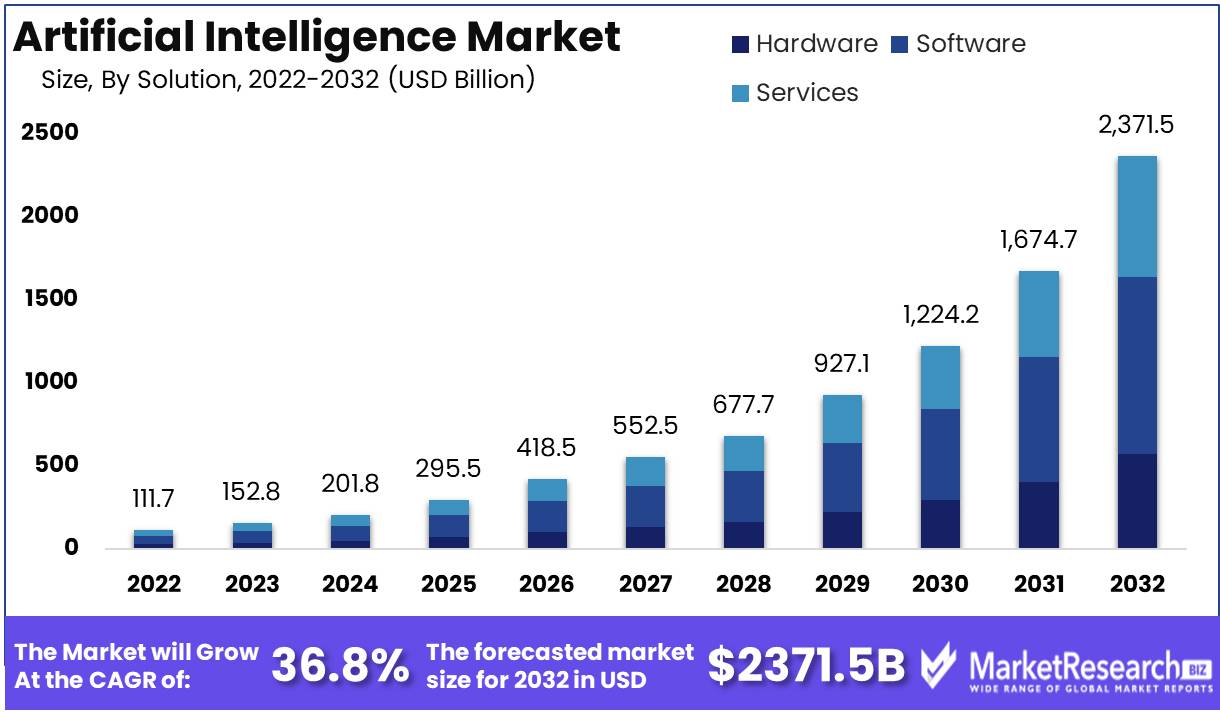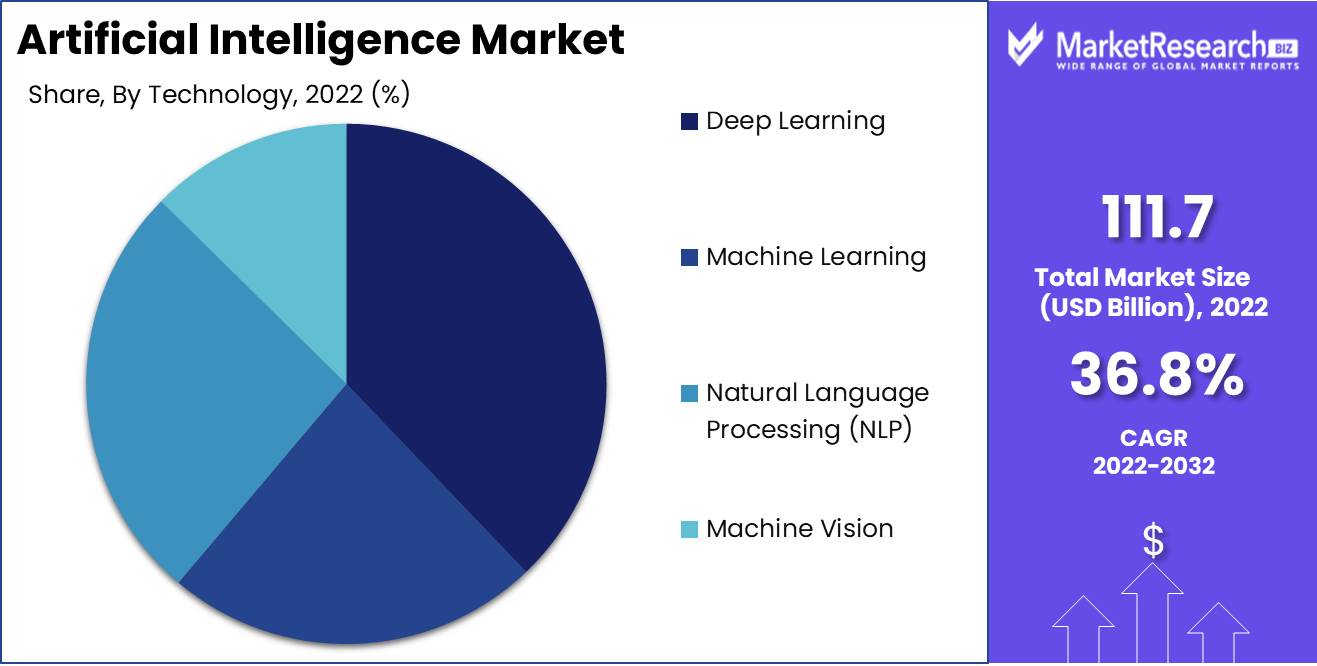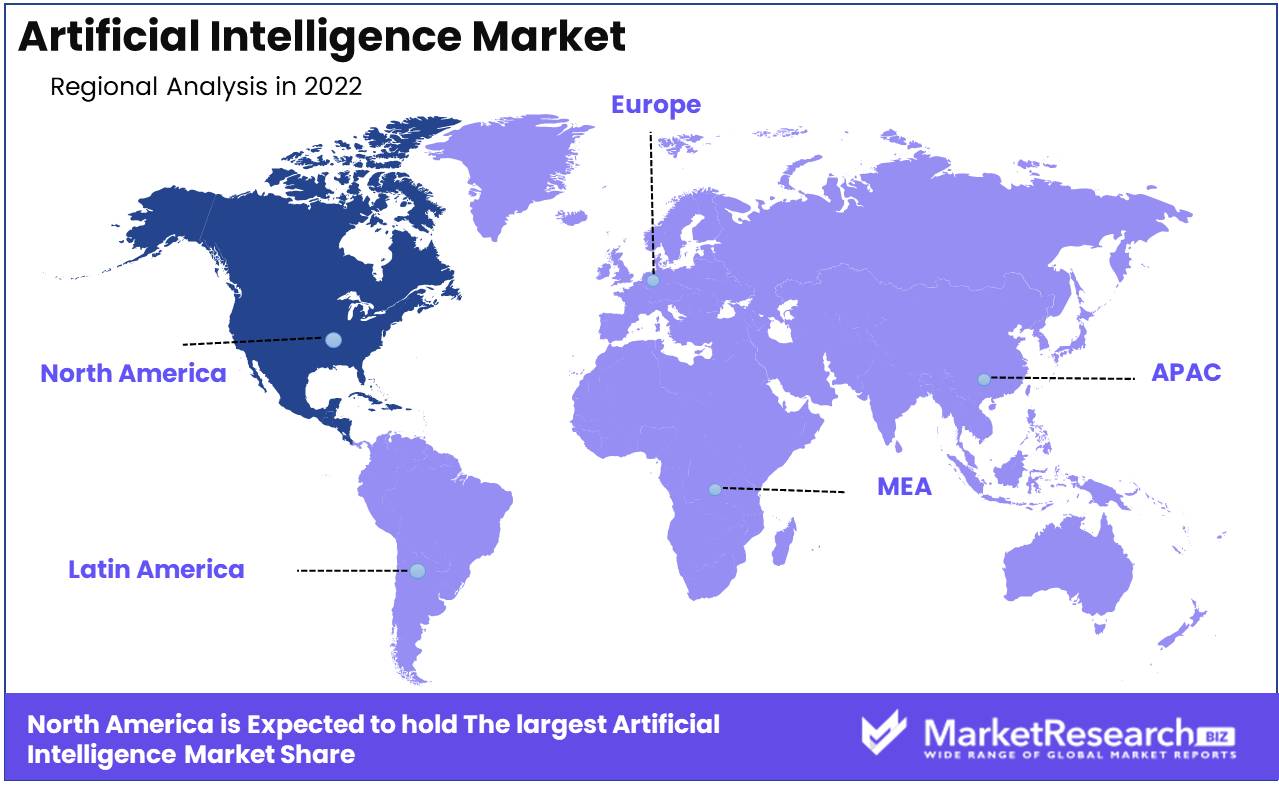
Artificial Intelligence Market By Solution (Hardware, Software, Services), By Technology (Deep Learning and Machine Learning), By End-use (Advertising & Media, IT and Telecommunication, Retail and E-Commerce, and Others), By Region And Companies - Industry Segment Outlook, Market Assessment, Competition Scenario, Trends, And Forecast 2023-2032
-
297
-
March 2023
-
151
-
-
This report was compiled by Vishwa Gaul Vishwa is an experienced market research and consulting professional with over 8 years of expertise in the ICT industry, contributing to over 700 reports across telecommunications, software, hardware, and digital solutions. Correspondence Team Lead- ICT Linkedin | Detailed Market research Methodology Our methodology involves a mix of primary research, including interviews with leading mental health experts, and secondary research from reputable medical journals and databases. View Detailed Methodology Page
-
Quick Navigation
Report Overview
Artificial Intelligence Market size is expected to be worth around USD 2,371.5 Bn by 2032 from USD 111.7 Bn in 2022, growing at a CAGR of 36.8% during the forecast period from 2023 to 2032.
The field of Artificial Intelligence (AI) has made ripples in the tech industry, with numerous companies implementing AI technology into their products and services. We will provide a comprehensive overview of the Artificial Intelligence Market in this article. We will discuss the definition, objectives, and significance of artificial intelligence, highlight notable innovations in the field, and analyze significant investments and assimilation of products and services, as well as market growth and applications. In addition, we will examine the industries investing in AI, the primary market drivers for AI, ethical concerns, and responsible AI practices.

Artificial Intelligence is the branch of computer science concerned with the creation of intelligent machines that can reason, learn, and adapt similarly to humans. The purpose of artificial intelligence is to develop devices capable of performing tasks that normally require human intellect, such as speech recognition, decision-making, and visual perception.
AI's significance resides in its capacity to automate mundane and repetitive duties, reduce error rates, and increase productivity. AI can alter the game by supplying sophisticated analytics, predictive modeling, and more precise decisions. AI has the potential to enhance healthcare, autonomous transportation, and environmental sustainability, in addition to business operations.
Autonomous vehicles, natural language processing, and facial recognition are just a few of the significant advancements in AI that have occurred over the past few years. Deep Learning, which involves the construction of neural networks that can extract features from data and make accurate predictions, is one of the most significant AI developments of the past few years.
Artificial Intelligence Market is expanding at an alarming rate, and the leading tech companies are investing significantly in AI research and development. Google, Amazon, and Microsoft are incorporating artificial intelligence (AI) technology into their products and services, such as Google Assistant and Amazon Alexa.
Driving factors
Automation and Determination Require
Demand for automation and decision-making capabilities is currently one of the primary factors propelling Artificial Intelligence Market. AI-based automation has revolutionized business operations. Businesses have been able to automate processes such as customer service, order processing, and inventory administration by incorporating AI into their operations. Automation fueled by AI helps businesses reduce errors and increase efficiency, resulting in cost savings and increased output.
Another area in which AI has had a significant impact is decision-making. AI algorithms can now analyze enormous quantities of data and provide insights that were previously impossible. Organizations are utilizing this capability to make decisions based on data that are not only precise but also swift. Businesses utilize AI-powered tools to analyze trends, recognize patterns, and predict future trends in real time. This is particularly vital in the business world, where promptness is frequently a competitive advantage.
Innovations in Algorithms
In recent years, AI algorithms have evolved significantly, resulting in improved accuracy and performance. Now, machine learning algorithms can process data at a quicker rate, provide more accurate predictions, and identify data anomalies. Deep Learning algorithms have facilitated significant advancements in computer vision, speech recognition, and natural language processing. Advancements in algorithms have also led to the creation of AI-powered virtual assistants that can provide personalized recommendations and daily assistance to individuals.
Applications driven by AI
Currently, businesses in a variety of industries are adopting AI-powered applications at a rapid rate. Chatbots are one of the most prominent applications of AI. Chatbots are gaining popularity among businesses because they can automate customer service and provide support around the clock. Chatbots are also capable of managing multiple customer inquiries simultaneously, resulting in increased customer satisfaction.
Healthcare is another area where AI-powered applications have had an impact. AI algorithms are now capable of real-time analysis of a patient's medical history, symptoms, and test results, providing physicians with accurate diagnosis and treatment options. Applications propelled by AI are also used in the field of drug discovery, where they can screen millions of molecules and identify potential medications.
Data Availability
The availability of data is one of the primary market drivers for artificial intelligence. Large datasets have made it possible for AI algorithms to learn and develop from the data they were trained on. Companies generate enormous amounts of data daily, from consumer interactions to equipment sensors. Businesses are utilizing this data to obtain insights that were previously impossible. The availability of data has also led to the development of new applications and services powered by artificial intelligence. Today's business decisions are driven by data-driven insights, and AI is at the vanguard of this revolution.
Restraining Factors
Insufficient Transparency
Lack of transparency is one of the main issues with artificial intelligence. It is frequently challenging to comprehend how AI-powered decision-making systems reach their conclusions due to their reliance on complex algorithms. This lack of transparency can result in biased decisions or unanticipated outcomes, calling into doubt the AI's accuracy and dependability.
The absence of transparency can be remedied by creating a more robust AI governance framework. A governance framework for AI will ensure that the AI system is transparent and accountable in its design. It will also aid in the development of precise guidelines for the ethical use of AI, which will increase business and consumer confidence in AI systems.
Job Displacement Concerns
Concerns about job displacement have been expressed as a result of AI's ability to automate and perform repetitive tasks much quicker than humans. There are concerns that AI will displace humans, resulting in a loss of employment.
Nonetheless, there is a counterargument to this concern. AI has the potential to augment rather than supplant human capabilities. AI can automate mundane and repetitive duties, allowing humans to focus on more valuable and creative endeavors. This will result in the creation of new positions requiring human expertise and decision-making skills.
Ethical and Legal Difficulties
Artificial intelligence's lack of transparency has raised ethical concerns about its use in decision-making processes. There are concerns that AI could make discriminatory decisions based on factors such as race, gender, or age.
To address these concerns, it is necessary to establish explicit ethical guidelines for AI. A moral framework will aid in assuring that AI-driven decision-making is devoid of prejudice and discrimination. Governments can also create regulatory frameworks to enforce AI's ethical guidelines and standards. These frameworks will aid in fostering consumer and stakeholder confidence in the ethical application of AI.
High Prices
Implementing AI is expensive, which is one of the main concerns associated with it. Developing and deploying AI solutions necessitates substantial infrastructure, software, and hardware investments.
Developing cloud-based AI solutions is one way to reduce the cost of implementing AI. Cloud-based AI solutions can substantially reduce IT costs for enterprises. It also permits businesses to scale their AI solutions according to their needs. Additionally, businesses can invest in AI platforms that provide pre-built AI models and solutions, reducing the time required for development and deployment.
Solution Analysis
The artificial intelligence (AI) market has been growing at an astonishing pace in recent years, and it is expected to continue to surge in the years to come. The application of AI is vast, including software development, deep learning, and end-use in various industries such as healthcare, finance, manufacturing, retail, and more. Understanding the AI market segment is essential for companies to explore the growth opportunities and strategize their business. In this segment, we will analyze the solution framework of the AI market.
The software segment dominates the AI market during the forecast period. The software gives a structure to the data that the machine can analyze and provide insights. The software is made by developers, which is used to train the machine. The software segment is likely to grow due to the increasing demand for machine learning solutions and cloud-based technology. The software can manage massive data sets, making it easy for businesses to handle complex data.
Technology Analysis
The deep learning segment dominates the AI market in the forecast period. Deep learning is a subset of machine learning that works on algorithms that are closer to the neural networks of human brains. Deep learning enables machines to identify images, sounds, video, and data patterns that are difficult for a human being to notice. The technology has applications in speech recognition, image processing, voice recognition, and more.
The deep learning segment is witnessing increasing adoption due to its vast number of applications in various industries such as healthcare, finance, and education. The technology can work with large amounts of data, and companies are embracing it to automate their processes and improve efficiency. The deep learning segment of the AI market is anticipated to register a high growth rate over the forthcoming years due to its potential in identifying complex data patterns and trends, which is vital for businesses to make critical decisions.

End-Use Analysis
The advertising and media segment dominates the AI market in the forecast period. The advertising and media industry is continually exploring new opportunities, and AI technology is making it possible to cater to the personalized needs of the consumers. AI in advertising helps businesses target their audience more efficiently and effectively. Also, AI helps create intelligent content and automated workflows, which makes it easy for businesses to create relevant and interactive solutions.
The advertising and media industries are witnessing a shift in consumer behavior towards personalization. Consumers expect relevant and personalized experiences while interacting with brands. AI technology helps businesses cater to the needs of consumers without manual intervention. The adoption of AI in advertising and media is growing rapidly and is an emerging trend in the industry. The advertising and media segment is anticipated to register the fastest growth rate over the forthcoming years due to the increasing demand for personalization and accurate targeting.
Key Market Segments
By Solution
- Hardware
- Software
- Services
By Technology
- Deep Learning
- Machine Learning
- Natural Language Processing (NLP)
- Machine Vision
By End-use
- Advertising & Media
- IT and Telecommunication
- Retail and E-Commerce
- BFSI
- Healthcare
- Manufacturing
- Automotive
- Others
Growth Opportunity
AI's integration with IoT
The combination of AI and IoT has created an entirely new industry frontier. The Internet of Things enables interconnected smart devices to exchange data and monitor their surroundings. In contrast, AI is intelligent enough to actively analyze and extract insights from this data. The confluence of these technologies has produced a previously unimaginable level of automation.
Fueling Better Business Decisions
Without advancements in AI techniques such as machine learning, deep learning, natural language processing, and computer vision, the growth of AI would not have been conceivable. These techniques have substantially enhanced the precision and efficacy of AI systems, making them ideal for automating decision-making processes and facilitating superior business outcomes. Using AI-powered tools, businesses can recognize trends and patterns, optimize business operations, and enhance the consumer experience.
AI's Capabilities to Solve Real-World Problems
The expansion of AI-using application areas, such as autonomous vehicles, chatbots, healthcare, finance, and e-commerce, is driving the expansion of the AI market. These domains are being transformed by AI-driven solutions that enable intelligent automation, enhanced consumer experience, and improved decision-making. Through the use of AI-powered applications, businesses can improve operational efficiency, resource allocation, and profitability.
Collaboration for Ethical Standards
The incorporation of artificial intelligence (AI) into various applications has been met with skepticism from many communities due to privacy concerns, data biases, and fears that AI will supplant human employment. Collaboration between businesses, industry associations, governments, and academia to develop ethical guidelines can help combat these concerns and enhance the reputation of artificial intelligence. Ethical guidelines can guarantee that artificial intelligence (AI) systems are developed and utilized in a transparent, secure, and responsible manner that respects human rights.
Latest Trends
Integration of AI with Analytics on Huge Data Sets
The integration of artificial intelligence with big data analytics is reshaping the manner in which businesses obtain insights from massive amounts of data. AI algorithms can now analyze and process vast quantities of data in real-time, providing businesses with insights that were previously unattainable.
As AI algorithms become more sophisticated, businesses will be able to make more decisions based on data, resulting in enhanced performance, decreased expenses, and increased profitability. In the future years, the integration of AI with big data analytics is anticipated to be a major growth catalyst in the AI industry.
Expansion of AI within the Healthcare Sector
Additionally, AI is transforming the healthcare sector. Utilizing AI-powered tools improves disease diagnosis, drug discovery, and patient care. For instance, AI algorithms can analyze medical images and identify abnormalities more quickly and precisely than human physicians.
Healthcare providers are also utilizing AI-powered virtual assistants to increase patient engagement and decrease administrative burden. These virtual assistants can respond to patient questions, schedule appointments, and offer individualized health advice, thereby enhancing patient outcomes and satisfaction.
The emergence of AI-powered tools in the healthcare industry has the potential to save lives, lower healthcare costs, and enhance overall care quality.
Emergence of Virtual Assistants Powered by AI
Virtual assistants propelled by artificial intelligence are gaining popularity in both personal and professional contexts. These virtual assistants can assist with appointments, alarms, reservations, and weather updates, among other duties.
Businesses also use AI-powered virtual assistants to enhance customer service and reduce administrative burden. Chatbots, for instance, can respond to consumer inquiries and provide support much more quickly than human customer service agents.
As AI-powered virtual assistants advance, they will be able to perform more complex duties and provide consumers with a more customized experience. In the future years, the emergence of AI-powered virtual assistants is anticipated to be a major growth catalyst for the AI industry.
Responsible and Ethical AI Development
As the use of artificial intelligence becomes more prevalent, the importance of developing an ethical and responsible AI grows. AI algorithms are only as effective as the data they are trained on; if the data contains biases or inaccuracies, so will the AI system.
There is a growing fear that AI systems will perpetuate existing social and economic disparities. For instance, AI algorithms used in hiring may have a bias against certain demographics, perpetuating hiring practices that favor one group.
It is crucial that AI is developed in an ethical and responsible manner, ensuring that its benefits are distributed equitably throughout society. Several organizations, such as the Partnership on AI, have been created to advocate the ethical and responsible development of artificial intelligence.
Regional Analysis
North America's Dominance in Artificial Intelligence. Artificial intelligence (AI) is one of the most promising technological advancements of the 21st century. The development of AI technology has been on the rise and it has been adopted by many industries worldwide. However, North America, particularly the United States and Canada, dominates the AI market with its technological innovation and financial resources.
North America has become the leading continent in AI technology and how it has dominated the AI market. We will delve deep into the various aspects of AI technology that make North America the leader in AI, and we will also examine the different factors that have contributed to the region's success in the AI industry.
One of the significant reasons why North America dominates the AI market is the financial backing it receives. The United States and Canada have some of the most robust economies globally, which allows them to invest in research and development projects. AI development is not cheap as it requires significant investment in research and development, which is where North America excels. The region's capacity to invest in the research and development of AI technology is a significant factor in its dominance of the market.
North America's dominance in AI technology is its technological innovation. The United States and Canada are home to some of the world's most innovative companies and researchers that are continually pushing the boundaries of what is possible with AI. Industrial leaders like Google, Amazon, Microsoft, and Apple are all headquartered in North America, and they invest billions of dollars in developing AI technology that can change the world.
North America's dominance in AI technology is also attributed to its talent pool. The continent's education system is recognized worldwide as some of the best, and this has created a pool of highly skilled talent. With top-tier universities that offer courses in AI and related fields, it's easier for North American companies to find and hire the most talented individuals in the AI industry. The region's leading talent helps provide the necessary skills and expertise to stay ahead in the AI field.
The government's support for AI technology cannot be underestimated. Both Canada and the United States support and encourage the development of AI technology through legislation and regulation. The laws allow companies to secure funding and access to resources, including data. Furthermore, governments use AI to improve their citizen's lives and to solve societal problems.

Key Regions and Countries
North America
- US
- Canada
- Mexico
Western Europe
- Germany
- France
- The UK
- Spain
- Italy
- Portugal
- Ireland
- Austria
- Switzerland
- Benelux
- Nordic
- Rest of Western Europe
Eastern Europe
- Russia
- Poland
- The Czech Republic
- Greece
- Rest of Eastern Europe
APAC
- China
- Japan
- South Korea
- India
- Australia & New Zealand
- Indonesia
- Malaysia
- Philippines
- Singapore
- Thailand
- Vietnam
- Rest of APAC
Latin America
- Brazil
- Colombia
- Chile
- Argentina
- Costa Rica
- Rest of Latin America
Middle East & Africa
- Algeria
- Egypt
- Israel
- Kuwait
- Nigeria
- Saudi Arabia
- South Africa
- Turkey
- United Arab Emirates
- Rest of MEA
Key Players Analysis
Alphabet Inc., Microsoft Corporation, IBM Corporation, Amazon Web Services, Inc., Baidu, Inc., Intel Corporation, Nvidia Corporation, Samsung Electronics Co., Ltd., and Apple Inc. dominate the artificial intelligence market.
With the development of Google Brain, TensorFlow, and Google Assistant, Alphabet-owned Google is one of the foremost AI market competitors. Azure is Microsoft's AI infrastructure, which provides consumers with cloud-based AI services. Watson, owned by IBM, is a well-known AI platform that is extensively utilized across a variety of industry verticals. Amazon's Amazon Web Services offers AI services via Amazon Lex, Amazon Polly, and Amazon Rekognition.
Baidu, a Chinese internet behemoth, is a market leader in artificial intelligence (AI) with its Apollo project, an open-source infrastructure centered on self-driving vehicles. Intel Corporation offers a variety of AI solutions, such as the Intel Neural Compute Stick, a development tool for AI. Jetson is a platform developed by Nvidia that offers AI solutions for autonomous vehicles, robotics, and embedded IoT devices. Samsung Electronics Co., Ltd. has developed the intelligent assistant Bixby by investing significantly in AI and IoT. Apple Inc. has developed Siri, its artificial intelligence assistant, and is investing in its AI capabilities through acquisitions.
These major actors are at the forefront of the advancement of AI technology. Their investments in AI research and development and acquisitions of AI companies demonstrate the growing significance of AI in the technology industry. In the coming years, the AI market is anticipated to continue its development trajectory.
Top Key Players in Artificial Intelligence Market
- Atomwise Inc.
- Google Inc.
- IBM Corp.
- Microsoft Corporation
- Rocket Fuel Inc.
- Qlik Technologies Inc.
- MicroStrategy, Inc.
- Brighterion, Inc.
- Numenta, Inc.
- Sentient Technologies
- Inbenta Technologies, Inc.
Recent Development
- In 2022, Google LaMDA is A new AI platform designed to assist businesses in developing conversational AI applications and promises significant advances in natural language processing.
- In 2022, IBM Summit The world's most powerful AI supercomputer, anticipated to facilitate the development of numerous AI applications in a variety of industries.
- In 2023, Microsoft Azure AI: An artificial intelligence platform that offers a variety of tools and services to create, train, and deploy AI models.
- In 2023, , Amazon Rekognition: An AI service that enables the identification and analysis of objects and people in images and videos.
Report Scope:
Report Features Description Market Value (2022) USD 111.7 Bn Forecast Revenue (2032) USD 2,563.98 Bn CAGR (2023-2032) 36.8% Base Year for Estimation 2022 Historic Period 2016-2022 Forecast Period 2023-2032 Report Coverage Revenue Forecast, Market Dynamics, COVID-19 Impact, Competitive Landscape, Recent Developments Segments Covered By Solution (Hardware, Software, Services), By Technology (Deep Learning, Machine Learning, Natural Language Processing (NLP), Machine Vision), By End-use (Advertising & Media, IT and Telecommunication, Retail and E-Commerce, BFSI, Healthcare, Manufacturing, Automotive, Others) Regional Analysis North America – The US, Canada, & Mexico; Western Europe – Germany, France, The UK, Spain, Italy, Portugal, Ireland, Austria, Switzerland, Benelux, Nordic, & Rest of Western Europe; Eastern Europe – Russia, Poland, The Czech Republic, Greece, & Rest of Eastern Europe; APAC – China, Japan, South Korea, India, Australia & New Zealand, Indonesia, Malaysia, Philippines, Singapore, Thailand, Vietnam, & Rest of APAC; Latin America – Brazil, Colombia, Chile, Argentina, Costa Rica, & Rest of Latin America; Middle East & Africa – Algeria, Egypt, Israel, Kuwait, Nigeria, Saudi Arabia, South Africa, Turkey, United Arab Emirates, & Rest of MEA Competitive Landscape Atomwise Inc., Google Inc., IBM Corp., Microsoft Corporation, Rocket Fuel Inc., Qlik Technologies Inc., MicroStrategy, Inc., Brighterion, Inc., Numenta, Inc., Sentient Technologies, Inbenta Technologies, Inc. Customization Scope Customization for segments, region/country-level will be provided. Moreover, additional customization can be done based on the requirements. Purchase Options We have three licenses to opt for: Single User License, Multi-User License (Up to 5 Users), Corporate Use License (Unlimited User and Printable PDF) -
-
- Atomwise Inc.
- Google Inc.
- IBM Corp.
- Microsoft Corporation
- Rocket Fuel Inc.
- Qlik Technologies Inc.
- MicroStrategy, Inc.
- Brighterion, Inc.
- Numenta, Inc.
- Sentient Technologies
- Inbenta Technologies, Inc.




